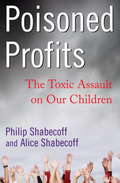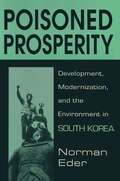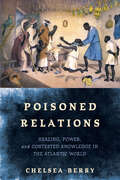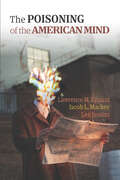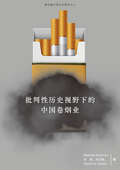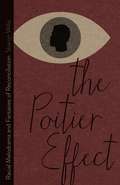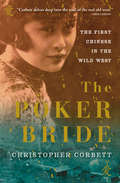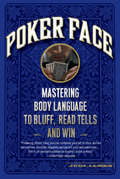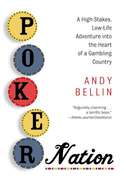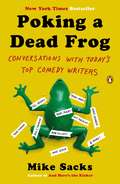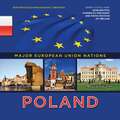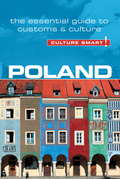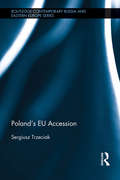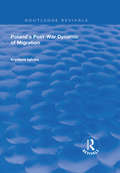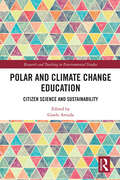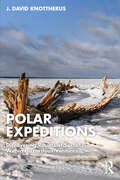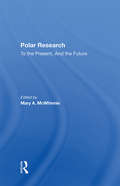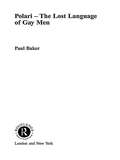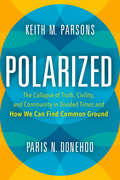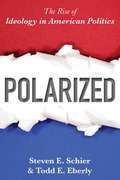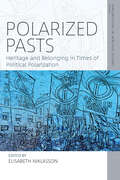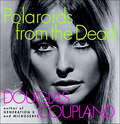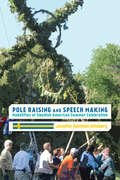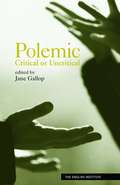- Table View
- List View
Poisoned Profits
by Philip Shabecoff Alice ShabecoffIn this shocking and sobering book, two fearless journalists directly and definitively link industrial toxins to the current rise in childhood disease and death. In the tradition of Silent Spring,Poisoned Profitsis a landmark investigation, an eye-opening account of a country that prizes money over children’s health. With indisputable data, Philip Shabecoff and Alice Shabecoff reveal that the children of baby boomers–the first to be raised in a truly “toxified” world–have higher rates of birth defects, asthma, cancer, autism, and other serious illnesses than previous generations. In piercing case histories, the authors identify the culprit as corporate pollution. Here are the stories of such places as Dickson, Tennessee, where babies were born with cleft lips and palates after landfill chemicals seeped into the water, and Port Neches, Texas, where so many graduates of a high school near synthetic rubber and chemical plants contracted cancer that the school was nicknamed “Leukemia High. ” The danger to our children isn’t just in the outside world, though. The Shabecoffs provide evidence that our homes are now infested with everything from dangerous flame retardants in crib mattresses to harmful plastic softeners in teething rings to antibiotics and arsenic in chicken–additives that are absorbed by growing and physically vulnerable kids as well as by pregnant women. Compounding the problem are chemical corporations that sabotage investigations and regulations, a government that refuses to police these companies, and corporate-hired scientists who keep pertinent secrets massaged with skewed data of their own. Poisoned Profitsalso demonstrates how people are fighting back, whether through grassroots parents’ groups putting pressure on politicians, the rise of “ecotheology” in the pulpits of formerly indifferent churches, or the new “green chemistry” being practiced in labs to replace bad elements with good. The Shabecoffs also include helpful tips on reducing risks to children in how they eat and play, and in how parents clean and maintain their homes. Powerful, unflinching, and eminently readable,Poisoned Profitsis a wake-up call that is bound to inspire talk and force change. From the Hardcover edition.
Poisoned Prosperity: Development, Modernization and the Environment in South Korea
by Norman R. EderA study of environmental degradation, this work presents the environmental problems of South Korea. The effects of rapid industrialisation and modernisation are documented along with the choices and actions which are available to the country.
Poisoned Relations: Healing, Power, and Contested Knowledge in the Atlantic World (The Early Modern Americas)
by Chelsea BerryIlluminates the competing understandings of poison and power in the Atlantic worldBy the time of the opening of the Atlantic world in the fifteenth century, Europeans and Atlantic Africans had developed significantly different cultural idioms for and understandings of poison. Europeans considered poison a gendered “weapon of the weak” while Africans viewed it as an abuse by the powerful. Though distinct, both idioms centered on fraught power relationships. When translated to the slave societies of the Americas, these understandings sometimes clashed in conflicting interpretations of alleged poisoning events.In Poisoned Relations, Chelsea Berry illuminates the competing understandings of poison and power in the Atlantic World. Poison was connected to central concerns of life: to the well-being in this world for oneself and one’s relatives; to the morality and use of power; and to the fraught relationships that bound people together. The social and relational nature of ideas about poison meant that the power struggles that emerged in poison cases, while unfolding in the extreme context of slavery, were not solely between enslavers and the enslaved—they also involved social conflict within enslaved communities.Poisoned Relations examines more than five hundred investigations and trials in four colonial contexts—British Virginia, French Martinique, Portuguese Bahia, and the Dutch Guianas—bringing a groundbreaking application of historical linguistics to bear on the study of the African diaspora in the Americas. Illuminating competing understandings of poison and power in this way, Berry opens new avenues of evidence through which to navigate the violence of colonial archival silences.
The Poisoned Stream: Gay Influence in Human History
by Scott LivelySpeaks to the influence the GLBT community had in Nazi Germany and later in the U.S.A.
The Poisoning of the American Mind
by Lawrence Eppard;Jacob Mackey;Lee JussimWhat would you have to believe in order to dress up as a shaman, paint your face, and storm the U.S. Capitol? What could possibly lead somebody to claim that it upholds white supremacy to encourage hard work, self-reliance, rational thinking, punctuality, and politeness? Such behaviors would have been unimaginable only a few years ago. And yet here we are, witnessing millions of people across the political spectrum displaying these clear indications of an epistemically poisoned mind. Both red America and blue America are retreating into their own information bubbles, seceding from a common reality. Both consume far too much misinformation and disinformation, developing worldviews that can sometimes be unintelligible to others. This book explores these disturbing developments and what they mean for our society and implores us all to recover a shared sense of what is true.
Poisonous Pandas: Chinese Cigarette Manufacturing in Critical Historical Perspectives (Studies of the Walter H. Shorenstein Asia-Pacific Research Center)
by Matthew Kohrman, Gan Quan, Liu Wennan, and Robert N. ProctorPlease note that this is a Chinese language edition. A favorite icon for cigarette manufacturers across China since the mid-twentieth century has been the panda, with factories from Shanghai to Sichuan using cuddly cliché to market tobacco products. The proliferation of panda-branded cigarettes coincides with profound, yet poorly appreciated, shifts in the worldwide tobacco trade. Over the last fifty years, transnational tobacco companies and their allies have fueled a tripling of the world's annual consumption of cigarettes. At the forefront is the China National Tobacco Corporation, now producing forty percent of cigarettes sold globally. What's enabled the manufacturing of cigarettes in China to flourish since the time of Mao and to prosper even amidst public health condemnation of smoking? In Poisonous Pandas, an interdisciplinary group of scholars comes together to tell that story. They offer novel portraits of people within the Chinese polity—government leaders, scientists, tax officials, artists, museum curators, and soldiers—who have experimentally revamped the country's pre-Communist cigarette supply chain and fitfully expanded its political, economic, and cultural influence. These portraits cut against the grain of what contemporary tobacco-control experts typically study, opening a vital new window on tobacco—the single largest cause of preventable death worldwide today.
The Poitier Effect: Racial Melodrama and Fantasies of Reconciliation
by Sharon WillisThe civil rights struggle was convulsing the nation, its violence broadcast into every living room. Against this fraught background, Sidney Poitier emerged as an image of dignity, discipline, and moral authority. Here was the picture-perfect black man, helping German nuns build a chapel in The Lilies of the Field and overcoming the prejudices of recalcitrant students in To Sir with Love, a redneck sheriff in In the Heat of the Night, and a prospective father-in-law in Guess Who&’s Coming to Dinner. In his characters&’ restrained responses to white people&’s ignorance and bad behavior, Poitier represented racial reconciliation and reciprocal respect—the &“Poitier effect&” that Sharon Willis traces through cinema and television from the civil rights era to our own.The Poitier effect, in Willis&’s account, is a function of white wishful thinking about race relations. It represents a dream of achieving racial reconciliation and equality without any substantive change to the white world. This notion of change without change conforms smoothly with a fantasy of colorblindness, a culture in which difference makes no difference. Willis demonstrates how Poitier&’s embodiment of such a fantasy figures in the popular cinema of the civil rights era—and reasserts itself in recent melodramas such as The Long Walk Home, Pleasantville, Far from Heaven, and The Help. From change without change to change we can believe in, her book reveals how the Poitier effect, complicated by contemporary ideas about feminism, sexuality, and privilege, continues to inform our collective memory as well as our visions of a postracial society.
The Poker Bride: The First Chinese in the Wild West
by Christopher CorbettThis true story of a concubine and the Gold Rush years &“delves deep into the soul of the real old west&” (Erik Larson). &“Once the discovery of gold at Sutter&’s Mill launched our &‘national madness,&’ the population of California exploded. Tens of thousands of Chinese, lured by tales of a &‘golden mountain,&’ took passage across the Pacific. Among this massive influx were many young concubines who were expected to serve in the brothels sprouting up near the goldfields. One of them adopted the name of Polly Bemis, after an Idaho saloonkeeper, Charlie Bemis, won her in a poker game and married her. For decades the couple lived on an isolated, self-sufficient farm near the Salmon River in central Idaho. After her husband&’s death, Polly came down to a nearby town and gradually spoke of her experiences. Journalist Christopher Corbett movingly recounts Polly&’s story, integrating Polly&’s personal history into the broader picture of the history of the mass immigration of Chinese. As both a personal and social history, this is an admirable book.&” —Booklist &“A gorgeously written and brilliantly researched saga of America during the mad flush of its biggest Gold Rush. Christopher Corbett&’s genius is to anchor his larger story of Chinese immigration around a poor concubine named Polly. A tremendous achievement.&” —Douglas Brinkley &“Uses Bemis&’s story as a platform for a larger discussion about the hardships of the Chinese experience in the American West.&” —The Washington Post
Poker Face
by Judi JamesThe outcome of card games rests heavily on luck, but poker is predominantly a game of skill - and a major part of that skill is the ability to read an opponent's body language while maintaining control over your own unspoken signals. Explains each stage of lying and bluffing: James - a top body-language guru and image consultant - lays down, step by step, how to disguise your hand and unmask bluffers. By identifying body language giveaways - from posture, facial expressions, to how players hold their cards and chips - and what they reveal, we learn how to hide our emotions and give off misleading cues. Identifies four main poker "personalities": Most players display the traits of one of four different personality groups that influence how they play poker. Their verbal interactions and body language give them away. For each personality, Poker Face reveals the key physical tells that expose bluffing and winning or losing hands.
Poker Nation
by Andy BellinJournalist and poker fanatic Andy Bellin takes readers on a raucous journey into the shut-up-and-deal world of professional poker. From basement games to the World Series of Poker in Las Vegas, you'll look over his shoulder as he learns to count cards, read a legendary player's body language, hang in there when the chips are down, and take his beatings like a man. Even if you don't know the difference between a flop and a river card, Bellin keeps you in the game with his portraits of the colorful players, dreamers, hustlers, and eccentrics who populate this strange subculture. Along with learning what goes on behind the scenes in illegal poker clubs, you'll get great advice on how to play Texas Hold'em, today's game of choice for big-money players.
Poking a Dead Frog
by Mike SacksAmy Poehler, Mel Brooks, Adam McKay, George Saunders, Bill Hader, Patton Oswalt, and many more take us deep inside the mysterious world of comedy in this fascinating, laugh-out-loud-funny book. Packed with behind-the-scenes stories--from a day in the writers' room at The Onion to why a sketch does or doesn't make it onto Saturday Night Live to how the BBC nearly erased the entire first season of Monty Python's Flying Circus--Poking a Dead Frog is a must-read for comedy buffs, writers and pop culture junkies alike. "No one generates more interesting, revealing, or entertaining interviews than Mike Sacks. Poking a Dead Frog is a classic." --Bob Odenkirk "This book is what I really look forward to in a book about humor: rich with words and humor, and funny stories with words. Thank you for your time." --Will Ferrell "These interviews go to dark depths and offer useful, applicable insight into how excellent comedy is written. If you read it, you're going to be better at writing comedy and may even wind up in a position where you can take jobs away from the younger interviewees. I specify the younger interview subjects because some of the older ones will die soon." --Rob Delaney "I wish I'd had a book like this when I was trying to break in. Also, a book on personal hygiene." --Jack Handey
Poland (Major European Union Nations)
by Heather DocalavichPoland is an Eastern European country that is stepping up on the world stage. It joined the EU in 2004 as part of that journey. For a long time, Poland has been home to scientific thinkers, artists, and musicians. Today, it is one of the countries that have weathered the global recession the best, proving this nation's strength. Discover more about this exciting, modern nation!
Poland - Culture Smart!
by Greg AllenCulture Smart! provides essential information on attitudes, beliefs and behavior in different countries, ensuring that you arrive at your destination aware of basic manners, common courtesies, and sensitive issues. These concise guides tell you what to expect, how to behave, and how to establish a rapport with your hosts. This inside knowledge will enable you to steer clear of embarrassing gaffes and mistakes, feel confident in unfamiliar situations, and develop trust, friendships, and successful business relationships.Culture Smart! offers illuminating insights into the culture and society of a particular country. It will help you to turn your visit-whether on business or for pleasure-into a memorable and enriching experience. Contents include* customs, values, and traditions* historical, religious, and political background* life at home* leisure, social, and cultural life* eating and drinking* do's, don'ts, and taboos* business practices* communication, spoken and unspoken"Culture Smart has come to the rescue of hapless travellers." Sunday Times Travel"... the perfect introduction to the weird, wonderful and downright odd quirks and customs of various countries." Global Travel"...full of fascinating-as well as common-sense-tips to help you avoid embarrassing faux pas." Observer"...as useful as they are entertaining." Easyjet Magazine"...offer glimpses into the psyche of a faraway world." New York Times
Poland's EU Accession (Routledge Contemporary Russia and Eastern Europe Series)
by Sergiusz TrzeciakThis book examines the process of Poland’s accession negotiations to the European Union between 1998-2003. An empirical study based on Robert Putnam’s two-level game model, it charts the influence and role of key domestic actors and groups on the negotiations especially in three critical, controversial, areas - areas where EU accession threatened to bring about a profound transformation to Polish life - agriculture, with particular emphasis on direct payments and production quotas; the purchase of real estate by foreigners; and the free movement of labour. This book demonstrates the complex interaction between the domestic and international level of negotiations and furthermore, shows how critical this link can be to negotiation outcomes at the international level. It reveals how susceptible Poland’s negotiation process was to domestic pressure, particularly public opinion and interest groups. Drawing heavily on qualitative analysis – such as press releases, news wires, policy documents, as well as quantitative analyses, such as the use of opinion polls, and supported by in-depth, unrestricted interviews with key Polish decision-makers, this book examines the dynamics of policy formation in Poland and shows how this translated into the final conditions of accession.
Poland's Post-War Dynamic of Migration (Routledge Revivals Ser.)
by Krystyna IglickaThis title was first published in 2001. The first comprehensive, combined socio-economic and political analysis of the trends and mechanisms of international migration from and into Poland since 1945, from the point of view of the forthcoming enlargement of the European Union.
Polar and Climate Change Education: Citizen Science and Sustainability (Research and Teaching in Environmental Studies)
by Gisele ArrudaThis book presents ideas for strengthening the foundations for transformational change in polar and global education leadership in all stages of the education process.Despite being an established concept endorsed by the United Nations Educational, Scientific and Cultural Organization (UNESCO), Education for Sustainable Development (ESD) is still not in the educational mainstream but is vital in mitigating against the intensifying impacts of global change and adapting to the shifts that have already occurred. Drawing on examples from real world projects in the United States, Germany, Mexico, Japan, Peru and Greenland, this book assesses the new educational strategies, pedagogies and technologies which have been adopted by polar educators to stimulate students’ interests in sustainability and re-orient education to global citizenship science. The experiential nature of the pedagogies shown in the case studies and educational activities builds background knowledge of cutting-edge research and empowers participants to communicate authentic research practices and show how data collection in the polar region is applicable in other parts of the globe.Highlighting the many ways in which educators for global citizenship can have a decisive role in transforming individuals and society, this book will be of great interest to students and scholars of climate change, education and Arctic studies. It will also be a valuable resource for professional educators working in ESD.
Polar Expeditions: Discovering Rituals of Success within Hazardous Ventures
by J. David KnottnerusPolar Expeditions employs structural ritualization theory to show how rituals enriched the lives of crewmembers on 19 polar expeditions over a 100-year period. J. David Knottnerus identifies and compares failed, successful, and extremely successful missions in terms of participation in ritual practices and the social psychological health of crews, finding that that social and personal rituals, such as work practices, religious activities, games, birthday parties, special dinners, or taking walks are extremely important in increasing crewmembers' ability to cope with the challenges they face including extreme dangers, isolation, restricted environment, stress, lengthy journeys, and quite importantly the disruption of those practices that define our everyday lives. Besides contributing to our knowledge about polar expeditions, this research yields implications for our understanding of ritual dynamics in other situations such as disasters, refugee camps, nursing homes, traumatic experiences, and a new type of hazardous venture, space exploration.
Polar Research: To The Present, And The Future
by Mary A. McwhinnieHighlighting twenty years of U.S. scientific research conducted since the International Geophysical Year (IGY) of 1957-58, this volume marks a turning point in the history of polar investigations and provides a lucid summary of the contributions of many distinguished scientists. The authors provide an overview of major polar research programs, past and present; explore concepts derived, from highly interrelated aspects of physical and life sciences; and seek to offer a glimpse of future polar science and polar development. The introduction briefly describes major physical, biological, and interdisciplinary research programs, as well as the magnitude, extent, and international character of contemporary polar science. Twenty years of polar biological investigations are then reviewed, and subsequent chapters address principles and advances in meteorology, physical oceanography, glaciology, and the geological evidence that hears on the origin of Antarctica. These physical sciences delineate a matrix for the polar biospheres and provide a background for understanding the major categories of structure and dynamic functioning of the marine ecosystem, polar marine mammals, adaptational physiology, and terrestrial biotic adaptations.
Polari - The Lost Language of Gay Men (Routledge Studies in Linguistics #Vol. 1)
by Paul BakerPolari is a secret form of language mainly used by homosexual men in London and other cities during the twentieth century. Derived in part from the slang lexicons of numerous stigmatised and itinerant groups, Polari was also a means of socialising, acting out camp performances and reconstructing a shared gay identity and worldview among its speakers. This book examines the ways in which Polari was used in order to construct 'gay identities', linking its evolution to the changing status of gay men and lesbians in the UK over the past fifty years.
Polarized: The Collapse of Truth, Civility, and Community in Divided Times and How We Can Find Common Ground
by Keith M. Parsons Paris N. DonehooAn atheist philosopher and a Protestant minister interact in a constructive and respectful dialogue about their differing views on life, stressing the importance of honesty, civility, and community engagement at a time of polarized politics.Unity in diversity (e pluribus unum) -- the quintessential American value-- is under assault today, and along with it, our sense of shared community. In this book, an atheist philosopher and a United Church of Christ pastor demonstrate that common ground can still be found even by people with very different perspectives on life. In short, difference need not mean division. The authors focus on the importance of truthfulness, civility, and community. In a respectful dialogue, they exchange ideas on the nature of truth, the importance of honesty, the value of civility, the definition of community in a pluralistic society, respecting differences while avoiding divisiveness, and the consequences to our nation when ideological rancor and the demonizing of opponents dominate the public square. The authors have a personal stake as well as an intellectual interest in these issues, as they met in childhood and have maintained their friendship over the decades despite their very different life choices and career paths. They both view with alarm the widening fissures developing among Americans and conclude by pointing out a similar preference for diatribe over rational debate in the decades preceding the Civil War. At a time of shrill rhetoric, this measured, reasoned discussion between two friends shows that communication and respect are possible between people of good will.
Polarized: The Rise Of Ideology In American Politics
by Steven E. Schier Todd E. EberlyFrom campus protests to the Congress floor, the central feature of contemporary American politics is ideological polarization. In this concise, readable, but comprehensive text, Steven E. Schier and Todd E. Eberly introduce students to this contentious subject through an in-depth look at the ideological foundations of the contemporary American political machine of parties, politicians, the media, and the public. Beginning with a redefinition of contemporary liberalism and conservatism, the authors develop a comprehensive examination of ideology in all branches of American national and state governments. Investigations into ideologies reveal a seeming paradox of a representative political system defined by ever growing divisions and a public that continues to describe itself as politically moderate. The work’s breadth makes it a good candidate for a course introducing American politics, while its institutional focus makes it suitable for adoption in more advanced courses on Congress, the Presidency, the courts or political parties.
Polarized Pasts: Heritage and Belonging in Times of Political Polarization (Explorations in Heritage Studies #8)
by Elisabeth NiklassonWhen questions of belonging enter the forefront of political debates, so too does heritage. This volume draws critical voices from archaeology, anthropology and the classics into a conversation about political uses of the past in times of radical right populism. The authors show how ancient monuments and sites, bygone eras and political regimes, and even your genetic ancestry, can become wrapped up in polarized political debates. They also highlight how heritage, which is often thought of as a common good, can be dangerous in times of political polarization – erasing nuances between ‘us’ and ‘them’. Together, the texts pave the way for a better understanding of the political role of heritage in society.
Polaroids from the Dead: And Other Short Stories
by Douglas CouplandDouglas Coupland takes his sparkling literary talent in a new direction with this crackling collection of takes on life and death in North America -- from his sweeping portrait of Grateful Dead culture to the deaths of Kurt Cobain, Marilyn Monroe and the middle class.For years, Coupland's razor-sharp insights into what it means to be human in an age of technology have garnered the highest praise from fans and critics alike. At last, Coupland has assembled a wide variety of stories and personal "postcards" about pivotal people and places that have defined our modern lives. Polaroids from the Dead is a skillful combination of stories, fact and fiction -- keen outtakes on life in the late 20th century, exploring the recent past and a society obsessed with celebrity, crime and death. Princess Diana, Nicole Brown Simpson and Madonna are but some of the people scrutinized.
Pole Raising and Speech Making: Modalities of Swedish American Summer Celebration (Ritual, Festival, and Celebration)
by Jennifer Eastman AtteberyIn Pole Raising and Speech Making, author Jennifer Eastman Attebery focuses on the beginnings of the traditional Scandinavian Midsummer celebration and the surrounding spring-to-summer seasonal festivities in the Rocky Mountain West during the height of Swedish immigration to the area—1880–1917. Combining research in folkloristics and history, Attebery explores various ways that immigrants blended traditional Swedish Midsummer-related celebrations with local civic celebrations of American Independence Day on July 4 and the Mormons’ Pioneer Day on July 24. Functioning as multimodal observances with multiple meanings, these holidays represent and reconsider ethnicity and panethnicity, sacred and secular relationships, and the rural and the urban, demonstrating how flexible and complex traditional celebrations can be. Providing a wealth of detail and information surrounding little-studied celebrations and valuable archival and published primary sources—diaries, letters, speeches, newspaper reports, and images—Pole Raising and Speech Making is proof that non-English immigrant culture must be included when discussing “American” culture. It will be of interest to scholars and graduate students in ethnic studies, folklore, ritual and festival studies, and Scandinavian American cultural history.
Polemic: Critical or Uncritical (Essays from the English Institute)
by Jane GallopThese new essays by leading scholars examine some famous and less well-known instances of polemical encounters. The essays are enhanced by an interview with Gayatri Spivak, specially conducted by Jane Gallop for this volume Historically rigorous, theoretically astute, and sometimes wickedly funny, Polemic makes criticism a critical issue.
